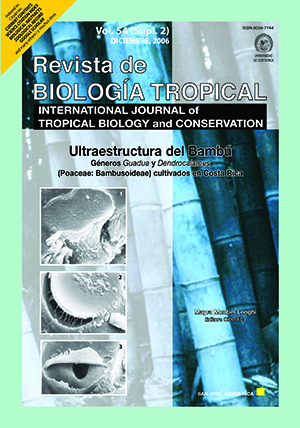Abstract
The anatomy of several parts of Guadua angustifolia var. bicolor was analyzed and characterized under a scanning electron microscope. Many similarities were observed with other Guadua species, particularly the presence of high dome stomata, of large cells with sinuous walls and of silica cells. Specific bicolor characteristics include (1) a different stomatal pattern in the adaxial zone of the leaf base (close to the sheath); (2) the abundance of hook-shaped trichomes without papilla; (3) the distinctive golden brown color of the bract that covers the culm (caused by papillar trichomes that cover the adaxial sheath); and (4) the size of the groups of auricular trichomes (formed by 12 trichomes). Rev. Biol. Trop. 54(Suppl. 2): 13-19. Epub 2006 Dec. 01.References
Bisen, S.S. 1999. Identification and classification of Indian Bamboos (SEM Atlas of epidermis). Bishen Singh Mahendra Pal Singh, Dehra Dum, India. 200 p.
Judziewicz, E.J., L.G. Clark, X. Londoño & M.J. Stern. 1999. American Bamboos. Smithsonian Institution, Washington D.C., Washington, Estados Unidos.
Londoño, X. 1989. Una nueva variedad de Guadua angustifolia Kunth de Colombia. Rev. Acad. Colomb. Cienc. Exactas Fis. Nat. 17: 379-381.
Metcalfe, C.R. 1960. Anatomy of the monocotyledons. I. Gramineae. Oxford Clarendon, Oxford, Inglaterra. 731 p.
Montiel, M.& R. García. 1985. Bambú: análisis de una alternativa de desarrollo. Universidad de Costa Rica, San José, Costa Rica. 16 p.
Montiel, M., V.M. Jiménez & E. Guevara. 2006. Caracterización anatómica ultraestructural de tres variaciones de la especie de bambú Guadua angustifolia, “Atlántica”, “Sur” y “Cebolla”, en Costa Rica. Rev. Biol. Trop. 54 (Supl. 2): 1-12.
##plugins.facebook.comentarios##

This work is licensed under a Creative Commons Attribution 4.0 International License.
Copyright (c) 2006 Revista de Biología Tropical






